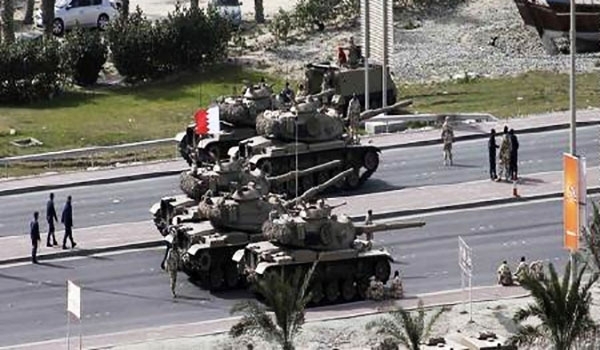
RNA - The onslaught came just days after President Donald Trump met with Bahrain’s King Hamad in Saudi Arabia at the weekend, where the US leader made a clear break from previous US policy. Trump told the despot it was "a great honor to be with you" and said there "has been a little strain but there won’t be strain with this administration."
The Bahraini regime has accused Sheikh Qassim, sentenced to a suspended one-year jail term allegedly for serving "foreign interests" and promoting "sectarianism and violence". A court last year stripped him of his citizenship, sparking repeated sit-ins outside his residence in Diraz.
These baseless accusations against Sheikh Qassim and pro-democracy protesters have failed to stop the international community, international human rights groups and governments from harshly condemning the regime’s clampdown on dissent. Yet, the latest moves by Manama - that come with Trump's green light - require immediate and rigid international action as the Saudi-backed Al-Khalifa regime seems set to intensify the crackdown on dissent even to more horrifying levels, and thousands of peaceful protestors who have been maimed, imprisoned and tortured now find themselves in a circle of imminent death either by the Saudi troops who shoot to kill dissidents from the age of 5 to 90 in the streets or specialized torturers who have admittedly been imported from other states.
- The regime’s treatment of wrongfully imprisoned detainees violates international standards on prisoner treatment and in many cases constitute cruel, inhuman, or degrading treatment. Sheikh Qassim went through the same sort of treatment while in custody. As maintained by Human Rights Watch, the regime refuses to ensure that all detainees are treated with humanity and in accordance with the United Nations Standard Minimum Rules for the Treatment of Prisoners, known as the Nelson Mandela Rules, including access to the adequate medical care they require and contact with their relatives.
- The regime is using new regulations to degrade and humiliate prisoners who clearly pose no escape risk. It refuses to take reasonable measures to prevent harm, instead shackling infirm patients, many of them torture victims, which clearly goes beyond any need for security.
- The regime refuses to immediately and unconditionally release all prisoners held solely for peacefully exercising their rights to freedom of expression and peaceful assembly. In addition to the shackling and torture, which has led the detainees to refuse to attend medical appointments in protest at what they perceive as degrading treatment, the authorities have cut visiting hours and the time for phone calls with their relatives.
- The regime shackles prisoners whenever they leave their cells which are locked most of the day. Those without bathrooms in their cell have only limited access to bathrooms. This is while the use of restraints on elderly or infirm prisoners who do not pose an escape risk constitutes ill-treatment.
- The prison authorities refuse to abide by the Nelson Mandela Rules by transferring patients requiring specialized treatment to specialized institutions or civil hospitals. The disproportionate use of physical restraints is degrading and is preventing detainees from getting the health care they require. This has also been largely the case for Sheikh Qassim.
- The Bahrain Independent Commission of Inquiry’s report says the regime continues to subject prisoners to a “discernible pattern of mistreatment,” including torture, after their arrests in many cases. Authorities also refuse to provide physical or psychological rehabilitation for detainees who were tortured.
Sadly, the Tuesday brutal crackdown on dissent suggests the brutality of the regime is exponentially increasing. Worse, as the people’s revolution unfolds, the regime continues to call on its despotic partners in the Middle East, mainly Saudi Arabia, to crush the uprising, with great impunity and no accountability. Most Western governments and Middle Eastern news sources have equally proven themselves complicit in Bahraini human rights violations, to be disappointingly biased, and lacking in condemnation or coverage of the situation.
Same is true about the United Nations. Through its deafening silence, the world body is fueling oppression in Bahrain. The US and UK governments in particular have gone out of their way to support Saudi Arabia and Bahrain both militarily and at the UN. Despite international outcry, they continue to strengthen relations with the regime, perhaps to keep their naval bases or to sell even more weapons so that their Persian Gulf vassal could stay in power for a few more years.
As people of conscience, it is incumbent upon the international civil society to do whatever is in their ability to raise awareness of this tragedy and to help the oppressed people of Bahrain. It’s the least they expect.
847/940